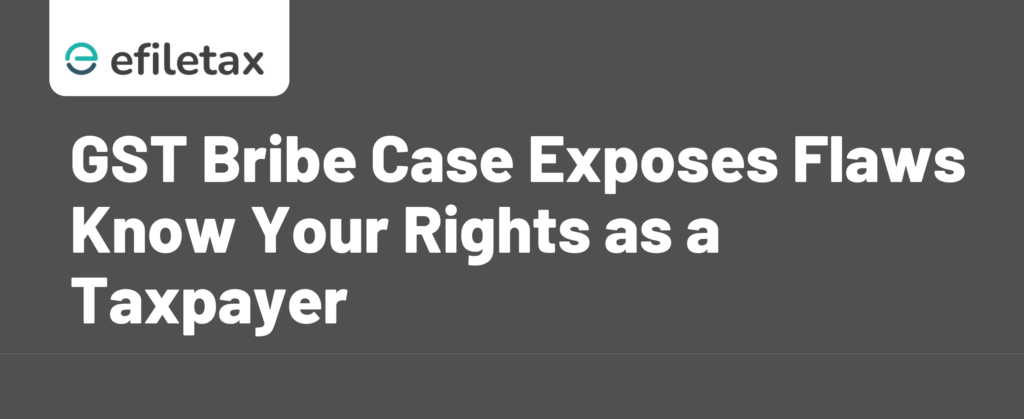
GST officer caught accepting ₹45K bribe What taxpayers must know
A GST officer was recently arrested for accepting a ₹45,000 bribe in connection with a pending tax assessment. The incident, reported by multiple sources, has raised serious concerns about corruption risks in GST proceedings.
At Efiletax, we break down what this means for Indian businesses and how you can legally protect your rights during GST assessments.
What happened?
- The officer allegedly demanded ₹45,000 from a taxpayer in exchange for a “favourable” tax assessment.
- The taxpayer filed a complaint, and a trap was set by the anti-corruption bureau.
- The officer was caught red-handed and now faces prosecution under the Prevention of Corruption Act.
Bribery is a criminal offence—for both the giver and the taker.
Why this matters for Indian taxpayers
Taxpayers often face harassment or unofficial demands during GST scrutiny or assessments, especially if records are unclear or delayed. But under the GST law, you are entitled to a fair, transparent assessment—without paying any bribes.
Know your rights under GST assessments
| Right | Legal Basis |
|---|---|
| Assessment must follow due process | Section 73 & 74, CGST Act, 2017 |
| Proper notice before any demand | Rule 142(1A), CGST Rules |
| Appeal available against orders | Section 107, CGST Act |
| File replies online via GST portal | Form GST DRC-06 |
| Report misconduct by GST officers | Centralised Public Grievance Redress (CPGRAMS) |
How to safeguard your business from GST harassment
✅ Maintain proper digital records and books of accounts.
✅ Respond to notices promptly via the official GST portal only.
✅ Never engage through intermediaries or “agents” promising faster clearances.
✅ Use a trusted CA, CS or tax consultant for communication.
✅ Report any suspicious or unlawful demand to anti-corruption helplines.
Legal references
- Section 73/74, CGST Act: Deals with demand and recovery for unpaid or short-paid tax.
- Rule 142(1A), CGST Rules: Mandates prior communication before formal notice (DRC-01).
- Prevention of Corruption Act, 1988: Governs penalties for public officials accepting bribes.
Expert View: A CA’s perspective
“With GST compliance becoming tech-driven, most legitimate assessments leave digital trails. If you’re compliant, no officer should demand money outside the system. Businesses must be firm and use legal remedies if pressurised.”
– CA Deepak Agarwal, Indirect Tax Specialist
FAQ: GST Assessment & Bribery
Q1: Can I refuse to pay an informal demand by a GST officer?
Yes. Politely decline and request all communication via official notices and email. If pressure continues, file a complaint.
Q2: Where do I report GST officer misconduct?
You can file complaints via pgportal.gov.in, or contact state-level Anti-Corruption Bureaus.
Q3: Will filing a complaint affect my case?
No. You are protected under law. Plus, Section 107 of the CGST Act allows appeal against wrongful assessments.
Summary for Google Snippet
A GST officer was caught accepting a ₹45,000 bribe during a pending tax assessment. Learn your legal rights under GST, how to respond to harassment, and the process to report corruption.